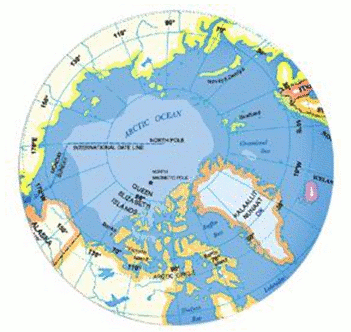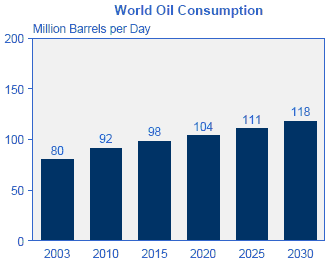

The Polar Dash for Oil
The Polar Dash for Oil
Luke Burgess, Pure Energy Report, 11-Jan-2007
COMMENT: The polar areas are special places on this earth. Both are largely untrammelled by the direct impacts of man, both awesomely rich laboratories for study of nature and the indirect impacts of man - the best places on earth for all nations to agree to suspend territorial claims, military presence, and exploitation.
This has been done in Antarctica with the 1959 Antarctic Treaty System. I'm sure it's not perfect, but it's a lot better than the "It's mine" hissyfit that is happening around the Arctic now that global warming and oil depletion are ganging up on the last places on earth we haven't dominated.
http://en.wikipedia.org/wiki/Antarctic_Treaty_System
We argued last year that expending energy to establish an international protection zone is preferable to gunboats and drillrigs. The subject then was increasing pressure, especially from the US, to open up the Northwest Passage to commercial shipping.
The Arctic: to defend or protect
http://www.sqwalk.com/blog2006/000935.html
Not all industry analysts think the Arctic will be the global oil honeypot that this writer seems to believe.
Arctic has less oil than earlier estimated
http://www.sqwalk.com/blog2006/000892.html
See also:
Melting Antarctic Ice Causing Sea Levels to Rise
http://www.sqwalk.com/blog2006/000701.html
Ticking Time Bomb
http://www.sqwalk.com/NewsItems2005.shtml
Arctic ice cap 1979 vs 2003
http://www.sqwalk.com/blog/000267.html
The Polar Dash for Oil
There's oil under the polar ice caps, but is it economic, and whose oil is it, anyway?
By Luke Burgess
Pure Energy Report
January 11, 2007
BALTIMORE, MD - As companies rush to find the new fields that will satiate our world's increasing demand for oil, their mad dash has pushed them to the ends of the earth, literally.
History Redux

In 1848, when Thomas Roys sailed the Superior through the Bering Strait, effectively becoming the first ship to pass through the narrow water gap between North America and Asia, he wasn't in search of new land, scientific discovery, or even fame.
He was after oil.
The truth is that whale oil prices escalated dramatically during that time period, mostly because whales were becoming scarce. As their numbers decreased rapidly, whalers like Roys were forced to move further into uncharted territory.
This scenario is being replayed again on the world stage. And while the characters are different today, the problem is the same.
Let's face it . . . global demand for oil isn't going away. Soaring demand and depleting reserves are just plain facts we face amidst our ever-growing dependence for oil.
The world currently produces nearly 85 million barrels of oil per day (MMbbls/d), and according to the Energy Information Administration, we will need an additional 13 MMbbls/d just to keep pace with our burgeoning economy over the next eight years.

And since no other energy source is ready to take over the reins, oil companies are literally going to the ends of the earth to alleviate this impending crisis.
The Great Untapped Polar Hope . . . or Hype?
Nestled to the north - maybe under Santa's workshop - could be the solution that the oil industry has been looking for.
The U.S. Geological Survey suggests that the Arctic Circle may hold more that 25% of the world's untapped reserves. And this number doesn't reflect the vast unknown potential the area contains. Fact is, the Artic Circle is one of the most unexplored areas left on earth, and could very well include oil fields that would rival those drilled in the Middle East.
This hope, however, is surrounded by much controversy, not to mention the present difficulties faced in producing the oil from such harsh terrain.
Amid possible record oil reserves, certain people are worried that the Arctic's fragile ecosystem would crumble under the rigs and drills of oil exploration.
Environmentalists leading the charge against drilling bring several points forward. One of their contentions is that the Arctic wildlife would suffer dramatically from oil exploration, including such risks as oil spills.
Among their other concerns is global warming. In recent decades, the Arctic has seen the largest increases in average temperatures throughout the world.
Also, the amount of oil that is estimated to be in the Arctic has been challenged lately, with advocates severely lowering the number of reserves calculated by the USGS.
But protesters aren't the largest obstacle for oil companies.
The biggest problem lies in the technology.
Drilling in extreme temperatures like the Arctic is a grueling, laborious task.
In order for the Arctic Circle to become an economic source for oil, new technology will be needed to lower the cost of drilling, or else the protesters may not even need to bring out their markers and placards.
The Geopolitical Arctic Scramble
The Arctic region is about to become the center of attention for exploration and production, and the major oil companies are looking to play.
At the moment, there is a veritable scramble to lay claim on potentially rich property. The problem here, however, are the raging disputes set to ignite from the main countries involved-the U.S., Canada, Russia, Norway, and Denmark.
Conflicts have already surfaced.
The U.S. and Canada quarrel over land in the North West Passage, while Norway and Russia have a similar conflict in the area of the Barents Sea, and whichever way a person looks, disagreements arise. Not to be outdone, Denmark has laid claim over the entire Arctic Circle!
Each country is attempting to carve out its own pieces to exploit the profit that is sure to be generated from oil companies' exploration and future production on the land. The geopolitical Arctic war has already begun, and these countries have all come out swinging.
Time is of the Essence
There is no denying the dire need to find new sources of oil will be upon us in the near future.
And if no clear successor to oil emerges in the next few years with no significant discoveries being made, two factors will remain consistent-demand will increase, and production will decrease.
This will drive oil prices skyward, and when our escalating energy dependence consumes us, it will make $100 oil look like the deal of a lifetime.
Even though we haven't come to that crossroad yet, the question is: will we be prepared to handle it?
Luke Burgess is the managing editor and publisher of GoldWorld.Com. He also writes a weekly column for EnergyAndCapital.Com, and WealthDaily.Net. Furthermore, Luke co-edits The Pure Energy Report and Secret Stock Files with Michael Schaefer.
Posted by Arthur Caldicott on 11 Jan 2007